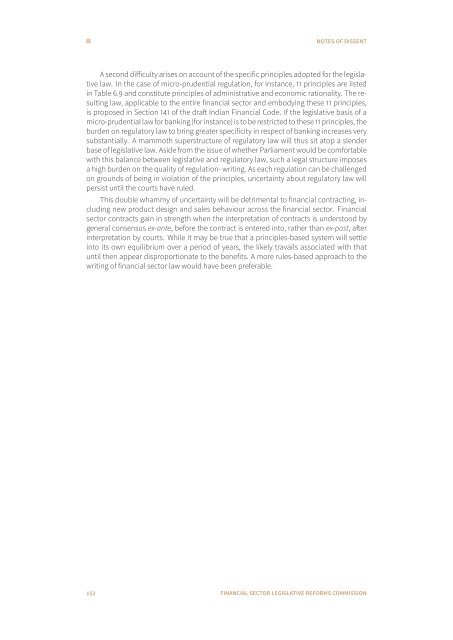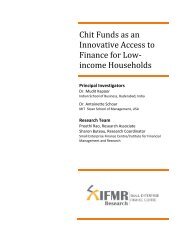Government of India Volume I: Analysis and Recommendations
Government of India Volume I: Analysis and Recommendations
Government of India Volume I: Analysis and Recommendations
Create successful ePaper yourself
Turn your PDF publications into a flip-book with our unique Google optimized e-Paper software.
NOTES OF DISSENT<br />
A second difficulty arises on account <strong>of</strong> the specific principles adopted for the legislative<br />
law. In the case <strong>of</strong> micro-prudential regulation, for instance, 11 principles are listed<br />
in Table 6.9 <strong>and</strong> constitute principles <strong>of</strong> administrative <strong>and</strong> economic rationality. The resulting<br />
law, applicable to the entire financial sector <strong>and</strong> embodying these 11 principles,<br />
is proposed in Section 141 <strong>of</strong> the draft <strong>India</strong>n Financial Code. If the legislative basis <strong>of</strong> a<br />
micro-prudential law for banking (for instance) is to be restricted to these 11 principles, the<br />
burden on regulatory law to bring greater specificity in respect <strong>of</strong> banking increases very<br />
substantially. A mammoth superstructure <strong>of</strong> regulatory law will thus sit atop a slender<br />
base <strong>of</strong> legislative law. Aside from the issue <strong>of</strong> whether Parliament would be comfortable<br />
with this balance between legislative <strong>and</strong> regulatory law, such a legal structure imposes<br />
a high burden on the quality <strong>of</strong> regulation- writing. As each regulation can be challenged<br />
on grounds <strong>of</strong> being in violation <strong>of</strong> the principles, uncertainty about regulatory law will<br />
persist until the courts have ruled.<br />
This double whammy <strong>of</strong> uncertainty will be detrimental to financial contracting, including<br />
new product design <strong>and</strong> sales behaviour across the financial sector. Financial<br />
sector contracts gain in strength when the interpretation <strong>of</strong> contracts is understood by<br />
general consensus ex-ante, before the contract is entered into, rather than ex-post, after<br />
interpretation by courts. While it may be true that a principles-based system will settle<br />
into its own equilibrium over a period <strong>of</strong> years, the likely travails associated with that<br />
until then appear disproportionate to the benefits. A more rules-based approach to the<br />
writing <strong>of</strong> financial sector law would have been preferable.<br />
152 FINANCIAL SECTOR LEGISLATIVE REFORMS COMMISSION



